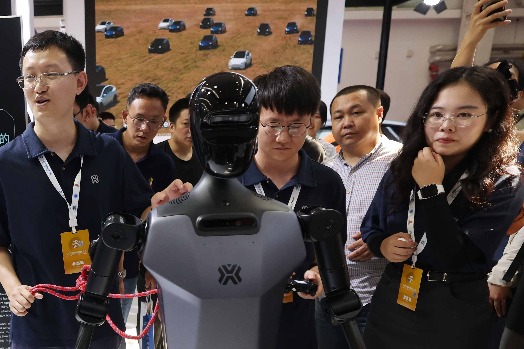Playing games online finally starts to pay off for China's skill-sharers


Those who dream of getting paid to play games can now do exactly that as demand for companion services takes off.
Today, Chinese novice gamers are paying master players to play with them and beat competitors in popular video games, such as King of Glory and League of Legends.
This burgeoning business has attracted a growing number of companies to cash in on the trend such as Bixin, an app that serves as a digital platform for the gaming community.
The app specifically caters to those born in the 1990s and 2000s who like playing video games. It offers game companion services for those who yearn for higher rankings in the games or are simply seeking better gaming experiences.
Lady Han Qi, 20, is a full-time skill-sharer on Bixin platform who usually spends more than eight hours a day playing and talking with novice gamers on the internet.
"I'm a die-hard fan of King of Glory," she said. "Making money by playing games is just such a perfect option. And I do feel some sense of achievement when I successfully help others get higher rankings in the game."
In fact, the job helps her make big money. She usually receives 500 orders a month, with a total income of about 30,000 yuan ($4,300).
Lin Song, CEO of Shanghai-based Bixin platform, said instead of being a subculture, the increasingly tech-savvy younger generation has fostered the strong cultural power of video games, creating a market worth tens of billions of yuan in the nation.
"Unlike those born in the 1970s and 1980s, the younger generation are more willing to pay for services such as game companionship. And they view playing games as a skill," Lin noted. "And we are dedicated to serving those who yearn for gaming companionship and those who are able to share gaming skills."
Lin claimed Bixin now has more than 20 million users, 85 percent of whom are aged between 18 and 30. Major paid users are living in first-, second-and third-tier cities.
According to Lin, among all users, 20 million are skill-sharers. Full-time skill-sharers usually earn 8,000 yuan to 10,000 yuan a month, and part-time sharers will earn an average of 3,000 yuan to 4,000 yuan a month.
"Major skill-sharers work part-time on Bixin platform, and many live in fourth-and fifth-tier cities where most people earn 2,000 yuan to 3,000 yuan a month," he said. "Doing a part-time job on Bixin really helps them make big money, and they would love to introduce Bixin to other gamers."
Gaming has become one of the most profitable industries in history, especially the blossoming esports sector. In 2019, the gaming sector generated 233 billion yuan in revenues, with a 8.7 percent year-on-year growth, according to Gamma Data Corp.
Wang Xu, chief analyst of Gamma Data, noted the revenues generated from the esports industry jumped 16.2 percent to 96.96 billion yuan in the first half of 2019, higher than that of the gaming sector.
"There's big growth potential in the esports market," Wang added. "With its rapid development, a wide range of businesses will emerge and thrive accordingly."
Seeing the growing trend of the younger generation's rising enthusiasm for esports, Lin from Bixin aims to boost the current user base tenfold in five years.
"Today, China has about quite a large number of gamers, among whom many are esports enthusiasts. As those born in the 1990s and 2000s gradually become the main driving force in the gaming market, we will see significant growth in the number of esports lovers. By then, I expect there will be still more players using the gaming companionship services," Lin said.
Lin has a larger goal to help foster the long-term and healthy development of the sector. In fact, Bixin is among the organizers of a certification test for esports trainers, guided by the Ministry of Industry and Information Technology.
"We hope to offer more career options for master players," Lin said. "In fact, we are already working with esports clubs, gaming companies, livestreaming platforms and short video platforms to offer a wide range of job options, such as professional esports players, online celebrities, voice actors and actresses."
"There's a job gap of 2 million in the esports market, and I believe the number will continue to increase," he added.




































